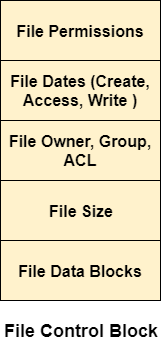Operating System
Process Management
Synchronization
Deadlocks
Memory Management
File Management
Misc
MCQ
On Disk Data StructuresThere are various on disk data structures that are used to implement a file system. This structure may vary depending upon the operating system.
Boot Control Block contains all the information which is needed to boot an operating system from that volume. It is called boot block in UNIX file system. In NTFS, it is called the partition boot sector. Volume control block all the information regarding that volume such as number of blocks, size of each block, partition table, pointers to free blocks and free FCB blocks. In UNIX file system, it is known as super block. In NTFS, this information is stored inside master file table. A directory structure (per file system) contains file names and pointers to corresponding FCBs. In UNIX, it includes inode numbers associated to file names. File Control block contains all the details about the file such as ownership details, permission details, file size,etc. In UFS, this detail is stored in inode. In NTFS, this information is stored inside master file table as a relational database structure. A typical file control block is shown in the image below. 
Next TopicIn memory Data structures
|
 For Videos Join Our Youtube Channel: Join Now
For Videos Join Our Youtube Channel: Join Now
Feedback
- Send your Feedback to [email protected]
Help Others, Please Share










